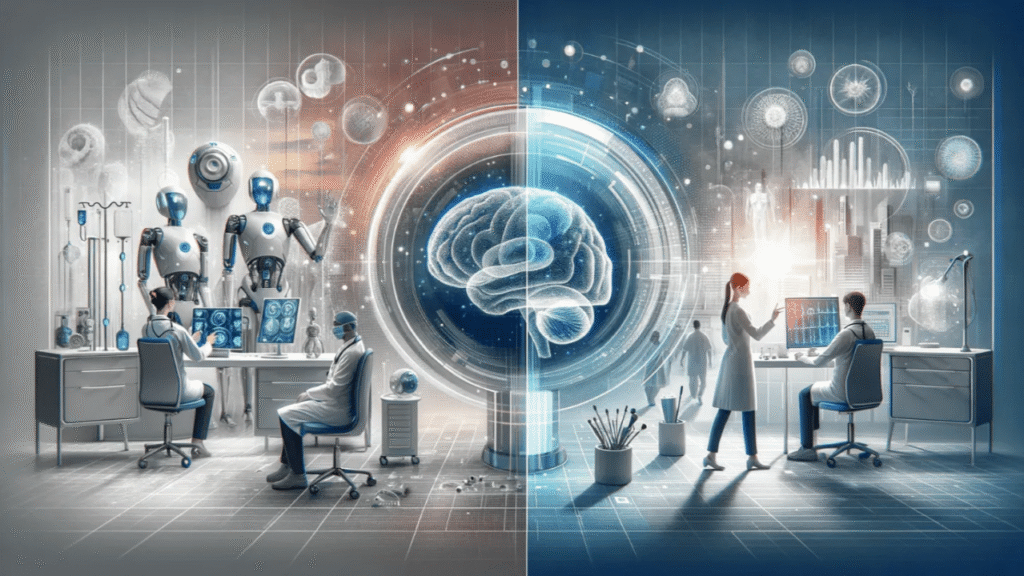The healthcare industry, traditionally reliant on human expertise and a vast, complex web of data, is currently undergoing a profound transformation. At the forefront of this revolution is Artificial Intelligence (AI), a technology that promises to enhance virtually every aspect of medicine, from diagnosing diseases with unprecedented accuracy to personalizing treatments and even assisting in delicate surgical procedures. This is not just a fleeting trend; AI in healthcare is a fast-growing and deeply impactful area that is reshaping the future of health.
Precision Diagnostics: The AI Eye
One of the most immediate and impactful applications of AI in healthcare is in diagnostics. Medical imaging – X-rays, MRIs, CT scans, and ultrasounds – generates immense amounts of data. Human eyes, no matter how trained, can sometimes miss subtle anomalies. This is where AI excels.

AI-powered algorithms, particularly those leveraging deep learning, are being trained on millions of medical images to identify patterns indicative of diseases. For instance, AI can detect early signs of cancer in mammograms or identify subtle lesions in brain scans that might be missed by human radiologists. Studies have shown AI models matching or even surpassing human accuracy in certain diagnostic tasks, leading to earlier detection and better patient outcomes.
Beyond imaging, AI can analyze vast amounts of patient data – electronic health records, lab results, genetic information – to assist in diagnosing a wide range of conditions, often before symptoms even become apparent.
Accelerating Drug Discovery: From Lab to Life-Saving Medication
The traditional drug discovery process is notoriously slow, expensive, and riddled with failures. It can take over a decade and billions of dollars to bring a new drug to market, with a high percentage of candidates failing in clinical trials. AI is drastically speeding up this process.
AI algorithms can analyze massive databases of biological, chemical, and pharmacological information to identify potential drug candidates, predict their efficacy, and even design new molecules from scratch. This “in silico” (computational) approach significantly reduces the time and resources spent on traditional lab experiments. AI can also predict potential side effects and interactions, leading to safer and more effective drug development. The goal is to bring life-saving medications to patients faster and at a lower cost, revolutionizing the pharmaceutical industry.
Personalized Medicine: Tailoring Treatment to You
Imagine a world where every treatment is perfectly tailored to your unique biological makeup. This is the promise of personalized medicine, and AI is its ultimate enabler. By analyzing an individual’s genetic information, lifestyle, environmental factors, and medical history, AI can create highly individualized treatment plans.
For example, AI can predict how a patient will respond to a particular medication, identify individuals at higher risk for certain diseases, or even recommend personalized preventive strategies. This shift from a “one-size-fits-all” approach to highly customized care holds the potential to significantly improve treatment effectiveness and reduce adverse reactions, leading to better overall health outcomes for each patient.
Robotic Surgery: Precision, Control, and Beyond
Robotic surgery has been around for some time, offering surgeons enhanced precision, dexterity, and visualization through minimally invasive techniques. AI is taking robotic surgery to the next level. AI algorithms can guide robotic arms with incredible accuracy, assist in complex decision-making during procedures, and even learn from past surgeries to continuously improve performance.
Benefits include smaller incisions, reduced blood loss, shorter hospital stays, and faster recovery times for patients. While the surgeon remains firmly in control, AI acts as a sophisticated co-pilot, augmenting human capabilities and pushing the boundaries of what’s possible in the operating room.
Challenges and the Human Element
Despite its immense potential, the integration of AI into healthcare isn’t without its challenges. Data privacy and security are paramount, given the sensitive nature of health information. Algorithmic bias, stemming from biased training data, could lead to unequal access to care or misdiagnoses for certain demographic groups. Transparency in how AI makes its decisions is also crucial for building trust among both medical professionals and patients.
Crucially, AI is intended to augment human intelligence, not replace it. The nuanced judgment, empathy, and ethical considerations of human healthcare professionals remain indispensable. AI will empower doctors, nurses, and researchers with unprecedented tools, freeing them from repetitive tasks and allowing them to focus on the truly human aspects of care.
The Future is Now
The integration of AI into healthcare is no longer a distant dream; it’s a rapidly accelerating reality. From improved diagnostics and accelerated drug discovery to personalized treatments and enhanced surgical precision, AI is poised to revolutionize healthcare as we know it. As the technology continues to evolve, the future promises a healthcare system that is more efficient, more precise, and ultimately, more centered around the individual patient. The journey has just begun, and the potential for a healthier future, powered by AI, is boundless.